
Bauhinia is a large genus of flowering plants in the subfamily Cercidoideae and tribe Bauhinieae, in the large flowering plant family Fabaceae, with a pantropical distribution. The genus was named after the Bauhin brothers Gaspard and Johann, Swiss-French botanists.

Cassia is a genus of flowering plants in the legume family, Fabaceae, and the subfamily Caesalpinioideae. Species are known commonly as cassias. The genus includes 37 species and has a pantropical distribution. Species of the genera Senna and Chamaecrista were previously included in Cassia. Cassia now generally includes the largest species of the legume subtribe Cassiinae, usually mid-sized to tall trees.

Calliandra is a genus of flowering plants in the pea family, Fabaceae, in the mimosoid clade of the subfamily Caesalpinioideae. It contains about 140 species that are native to tropical and subtropical regions of the Americas.

Parkia is a genus of flowering plants in the family Fabaceae. It belongs to the mimosoid clade of the subfamily Caesalpinioideae. Several species are known as African locust bean.

Piptadenia is a genus of tropical shrubs and trees of the family Fabaceae. It includes 28 species native to the tropical Americas, ranging from central Mexico to southern Brazil and northwestern Argentina.

Dimorphandra is a genus of legume in the family Fabaceae, subfamily Caesalpinioideae. It includes 26 species native to northern South America, ranging from Colombia and Venezuela to Bolivia, Paraguay, and southeastern Brazil.

Hydrochorea is a genus of flowering plants in the family Fabaceae. It includes 11 species native to Central and South America and west and west-central Africa. It belongs to the mimosoid clade of the subfamily Caesalpinioideae.

Macrolobium is a legume genus in the subfamily Detarioideae. It is a tropical genus with about 80 species. Half occur in Brazil, where they are common in the floodplains of the Amazonian Basin. Members of the genus are used as ornamentals and for their wood.

Macrosamanea is a genus of flowering plant in the legume family, Fabaceae. It includes 11 species of trees and shrubs native to northern South America. The genus is most diverse and numerous in the Amazon Basin, extending into the Orinoco basin and the Guianas. Typical habitat is tropical rain forest, mostly riparian and seasonally-flooded. Two species are native to seasonally-inundated wooded grassland (savanna) on sandy soils. The genus belongs to the mimosoid clade of the subfamily Caesalpinioideae.

Swartzia is a genus of flowering plants in the family Fabaceae. It was named in honor of Swedish botanist Olof Swartz and contains about 200 species. Swartzia is restricted in its geographical distribution to the New World Tropics, where it occurs primarily in lowland rainforests, but also in savannas, pre-montane forests, and tropical dry forests. While it can be found throughout the wet lowlands from Mexico and the Caribbean islands to southern Brazil and Bolivia, Swartzia is most abundant and species-rich in Amazonia, where 10–20 species may co-occur at a single site. The species of Swartzia are mostly trees, ranging from small understory treelets to large canopy emergents. Some species, especially in savannas, are mult-stemmed shrubs.
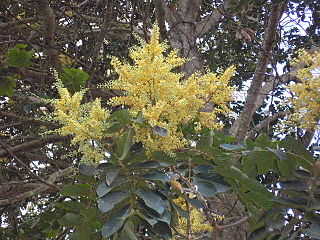
Tachigali is a flowering plant genus in the legume family (Fabaceae). It includes 74 species of trees native to the tropical Americas, ranging from Nicaragua to Bolivia, Paraguay, and southern Brazil. Typical habitats include tropical rain forest, lower montane forest, seasonally-flooded and non-flooded evergreen lowland forest and woodland, gallery and riparian forest, sometimes on white sands, cerrado and other dry woodland, and rocky grassland.
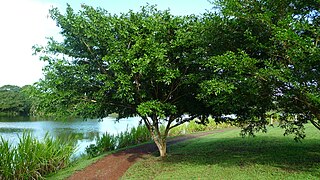
Zygia is a genus of flowering plants in the family Fabaceae. It includes 60 species of tres and shrubs native to the tropical Americas, from Southern Mexico and Cuba to northern Argentina. Typical habitats are tropical forest and coastal zones, generally below 900 meters elevation with a few species extending up to 2800 meters. It belongs to the mimosoid clade of the subfamily Caesalpinioideae.
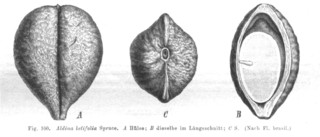
Aldina is a genus of trees in the Fabaceae native to the Guiana Shield and northern Amazonia. It is found in lowland humid forests. It is included in the Andira clade.
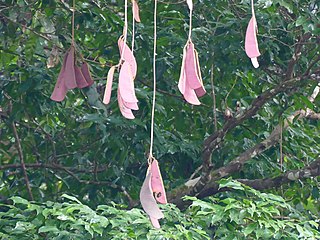
Eperua is a genus of flowering plants in the legume family, Fabaceae. It belongs to subfamily Detarioideae. It includes 16 species native to northern South America, in Colombia, Venezuela, the Guianas, and northern Brazil. They live in the jungles, often along rivers or streams. The leaves are compound pinnate, with smooth margins, and the fruits are long pods. The wood of E. falcata is called wallaba and is often used in construction.
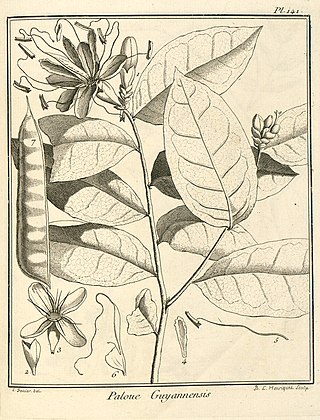
Paloue is a genus of flowering plants in the family Fabaceae. It belongs to the subfamily Detarioideae. The genera was first created with the description of Paloue guianensis by Aublet in 1775.
Clathrotropis is a genus of flowering plants in the family Fabaceae. It includes 7 species native to northern South America, ranging from Peru to Colombia, Venezuela, the Guianas, and northern Brazil. The genus belongs to subfamily Faboideae.

Hortia is a genus of plants in family Rutaceae, with 10 species native to Central America and northern South America.

Jupunba is a genus in the family Fabaceae. It is native to region from South Mexico extending to tropical America.

















